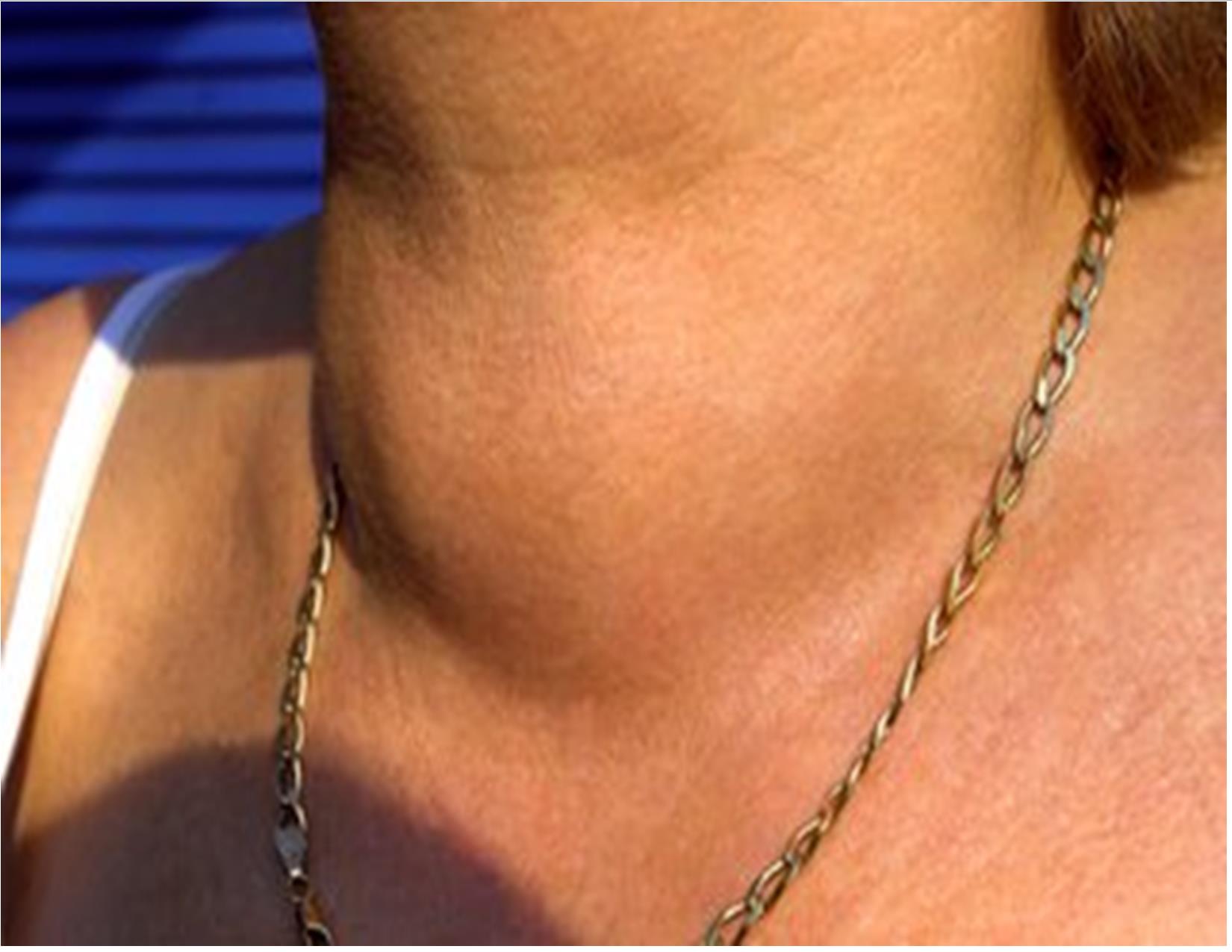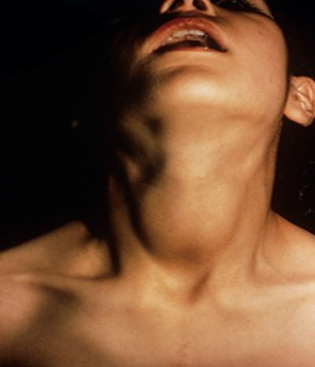Goitre

Goitre Goitre is a general term for an enlarged thyroid gland. Depending on the type of swelling, location, how it affects gland function and how long it has been present, goitre has various effects and is treated in a variety of different ways.
Alternative names for goitre Goiter; thyroid cyst; colloid goitre/goiter; nodular goitre/goiter; diffuse goitre/goiter; multi-nodular goitre/goiter; Plummer disease; Plummer’s disease; follicular adenoma
What is Goitre?

Swollen neck of a patient with goitre. The thyroid gland is a butterfly-shaped gland located in the neck. A normal-size thyroid cannot usually be felt. Any increase in size of the thyroid gland is called goitre. Goitre can be due to enlargement of the whole thyroid gland, known as ‘smooth goitre’ or ‘diffuse goitre’, or part of the gland, called a ‘nodular’ or ‘cystic’ goitre. Many people with goitre have normal thyroid hormone levels but some can have an underactive thyroid (hypothyroidism) or an overactive thyroid (hyperthyroidism).
What causes goitre? There are a number of different causes for goitre including:
- Iodine deficiency – iodine is an essential trace element which helps the thyroid gland to function properly and to make thyroid hormones. There are two main hormones called thyroxine and triiodothyronine. Approximately 2.2 billion people worldwide have iodine deficiency and roughly 29% of the world's population lives in an iodine deficient area. In the UK, most people have sufficient iodine in their diet. Non-organic milk and dairy products are a good source of iodine, as well as seaweed, fish and eggs. Some table salt is supplemented with iodine.
- Thyroiditis – this means inflammation of the thyroid gland. A number of causes can lead to swelling of the thyroid. The most common cause worldwide is Hashimoto's thyroiditis, which is due to immune cells attacking the thyroid gland (known as an autoimmune process) and is associated with the production of specific anti-thyroid antibodies. Thyroiditis can also occur for other reasons e.g. due to a viral infection, or during or shortly after a pregnancy. Thyroiditis is associated with a normal thyroid function in roughly 80% of cases. Hypothyroidism is present in the remaining cases; sometimes it can be anticipated by a transient increase of thyroid hormones levels due to their sudden release from the damaged gland.
- Graves' disease – this is an autoimmune disease where the immune system produces antibodies that persistently stimulate the thyroid, with consequent over-function (hyperthyroidism).
- Benign growths – these can take a number of different forms but follicular adenomas are the most common. They can be single (‘nodular goitre’) or, more frequently, multiple (‘multinodular goitre’). Thyroid nodules are usually associated with a normal thyroid function.
- Toxic nodular goitre (Plummer’s disease) – this is where a nodule is over-functioning, thus causes hyperthyroidism.
- Goitrogens – these are external factors that may cause the formation of goitre by disrupting the production of thyroid hormones. They include some drugs or medicines (e.g. lithium, which is used in the treatment of mental health problems) and certain foods such as vegetables from the cabbage family, cassava or kelp, although excessively high consumption of these foods would lead to goitre formation. In addition, a lack of micronutrients such as iron, selenium and vitamin A could also contribute to goitre formation, especially if associated with other causes, such as iodine deficiency.
- Physiological causes – these include increased demands for hormone production during pregnancy and puberty.
- Inherited causes – there are a number of genetic conditions that can increase the likelihood of goitre formation.
What are the signs and symptoms of goitre? It is common to have small nodules within the thyroid gland, which cannot be felt, but may be picked up by chance when scans or examinations are conducted for other reasons. In these cases, there have usually been no symptoms to indicate the presence of goitre. Larger goitres simply present as a lump in the neck. Occasionally, a large goitre will press on nearby structures, for instance making it difficult to swallow or to breathe.
How common is goitre? Worldwide, goitre is estimated by the World Health Organization to affect around 12% of people, although the rate of goitre in Europe as a whole is slightly lower. Goitre affecting a particular area (endemic) occurs in areas where there is iodine deficiency and is defined when more than 1 in 10 people have goitre.
Is goitre inherited? Some forms of goitre can be inherited. There is some evidence that the presence of goitre in one family member increases the chances of other family members having goitre.
How is goitre diagnosed? Goitre is diagnosed when the thyroid gland is enlarged enough to be felt by external touch or is clearly visible without a scan. Usually a GP will undertake thyroid function tests to measure the levels of thyroid hormones and thyroid antibodies in the bloodstream. They may also arrange an ultrasound scan or make a referral to an endocrinologist for outpatient assessment. Where more complex tests are required, they may include: ‘Fine needle aspiration’ of the thyroid gland. A thin needle is inserted under the guidance of ultrasound to remove a very small amount of thyroid tissue, which is studied under a microscope to determine the cell type(s) that are present. This procedure may need to be repeated more than once to get an adequate result. A thyroid 'uptake' scan. This will pick up differences in the activity of different areas of the thyroid.
How is goitre treated? Treatment depends on the underlying cause of the goitre. ‘Simple’ goitre, where there is no thyroid hormone imbalance and no problems arising from the size of the thyroid, is unlikely to cause problems. In case the goitre is large and symptomatic (difficult to swallow or to breathe), it may be appropriate to consider surgery (a thyroidectomy), though this will result in the patient requiring lifelong thyroxine (thyroid hormone) replacement. Treatment of overactive and underactive thyroid is explained in articles on hyperthyroidism and hypothyroidism, respectively.
Are there any side-effects to the treatment? Surgery carries the normal risks of any operation (the risks from anaesthetic, post-operative infection, haemorrhage, bleeding and scar formation), and will result in an underactive thyroid. It can rarely cause specific complications with damage to the recurrent laryngeal nerve (controlling the voice box) resulting in a hoarse voice, or damage to the glands around the thyroid (parathyroid glands), which control calcium. This may result in a low calcium level (hypocalcaemia) in the blood, which would require medication. What are the longer-term implications of goitre? Usually there are no long-term implications of goitre, and the safest thing is to avoid unnecessary surgery once medical assessment has been made.

